Nizhnekamskneftekhim sold products for 162bn rubles in 2017
Director General Azat Bikmurzin drew conclusions to the work of the company at a conference of the working collective that took place in the NKNKH head office. The year was successful for the enterprise – production of main products increased and long-term contracts with foreign companies were also signed. As for social responsibility, the industrial giant managed to meet all commitments in front of the collective. They will be saved in the same volume in a new collective agreement that was adopted for 3 years. Realnoe Vremya tells the details.
Increased production and new types of plastic
The jubilee year was successful for the enterprise – revenue from sold products totalled 162bn rubles. Production of synthetic rubber rose by 5%, which amounted to 704,000 tonnes – 83% of it was sent to big foreign companies. The volume of supplied plastic was about 700,000 tonnes. Production LD PE for stretch wrapper manufacturing – the product that managed to drive imported analogue out of major Russian refiners – increased by 70,000 tonnes as effective sale.
Above 183,000 tonnes of neodymium butadiene rubber was made in the Synthetic Rubber Factory, which became a record in production history. Employees of the Styrene and Polyether Resins Factory made more than 305,000 tonnes of styrene for the first time in the factory's history. One millionth tonne of halobutyl rubber, 4 millionth tonne of isoprene and 17 millionth tonne of ethylene are among the achievements of the enterprise in 2017.
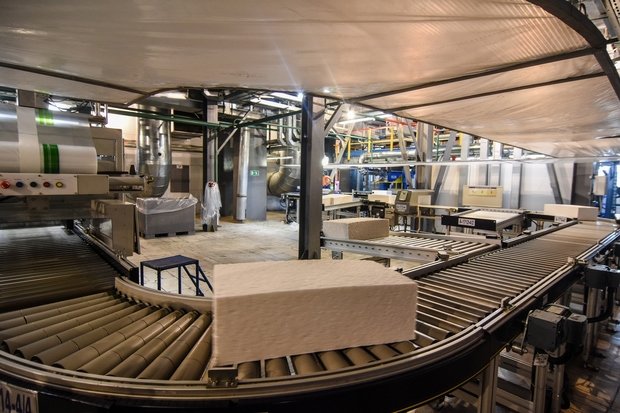
Last year, specialists of the enterprise offered to master new types of plastic. A type that's used to produce casting packaging, a type to make a sleeved and laminated film of high endurance, several types of shatter-proof polystyrene and polystyrene of general purpose with a low content of residual styrene for making goods that are in contact with food are among the novelties.
The new production of formaldehyde by Formox's technology was launched in the Isoprene-Monomer Factory in 2017. It became the first stage in augmenting capacities of the Isoprene-Monomer Factory. The construction of isobutylene and reconstruction of the Isoprene Factory are coming to an end at the second stage. It all will allow to increase isoprene rubber production to 330,000 tonnes a year.
In 2017, the enterprise continued to strengthen partnership relations with foreign companies. In June, a framework agreement on construction of the first stage of the Olefin Complex with a capacity of 1,200 tonnes – new production of EP-600 – was signed between Nizhnekamskneftekhim and Linde from Germany at the Petersburg Economic Forum.
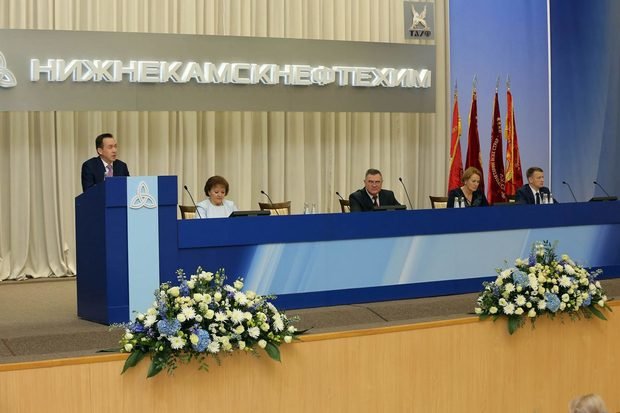
''The second stage is also discussed that includes an analogous ethylene complex. Now they're preparing to borrow money. According to the contract, last year, Linde evaluated the impact of the project on the environment and social sphere, which was carried out in compliance with international requirements. Compliance with requirements in ecology and social responsibility is one of the compulsory conditions of creditors to make a decision on granting a loan,'' said Director General of Nizhnekamskneftekhim PJSC Azat Bikmurzin.
In addition, long-term contracts with foreign tyre companies on rubber supply were signed.
New collective agreement for 3 years
Stable development of Nizhnekamskneftekhim allowed the enterprise to meet all social commitments in front of its employees that are mentioned in the collective agreement. Last year, the company sent money for health care and holidays of employees and their children. For instance, 2,148 petrochemists and 509 labour veterans improved their health in Korabelnaya Roscha health centre. Another 670 children were on holiday with their parents in Mother and Child programme. A major overhaul was carried out in the health centre, bathes were purchased, and equipment in rooms of guests was updated. More than 1,500 kids had a rest in Yunost health camp and Olympiyets sports camp.
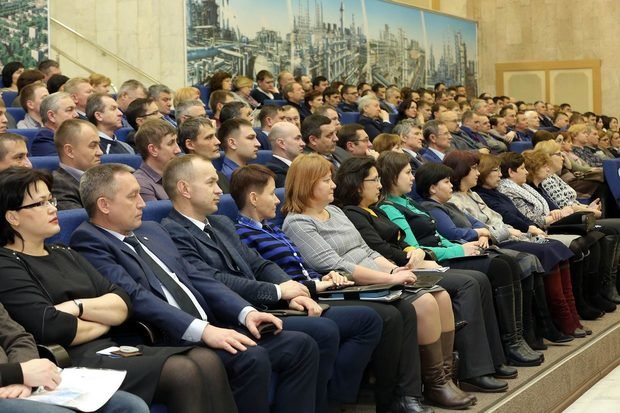
Preparation of employees is a separate area in the collective agreement. 12,743 workers studied in 2017. NKNKH also fulfils a programme to improve labour conditions, continues working with the youth, popularises sport among the workers, gives money to support young families and construction of houses. 757 flats were distributed last year.
Chairman of the United Trade Union Adip Khairullin delivered a speech in front of the collective of workers with a report on fulfilment of the collective agreement in 2017. The reporter focused on more prioritised areas of activity of the company's trade union. Provision of safe labour conditions at work, social guarantees and compensations, youth politics, medicine, physical culture and sport are among them. Articles of the social sphere became considerable costs of the trade union's budget: health care and holiday for union members and their children, financing of health establishments, work with the youth and development of sport among kids and workers, purchase of sports equipment, organisation of mass sports events. Union members got financial help, the Regional Committee expended financial help by Mother's Day. He noted that all commitments mentioned in the 2017 collective agreement were fully met.
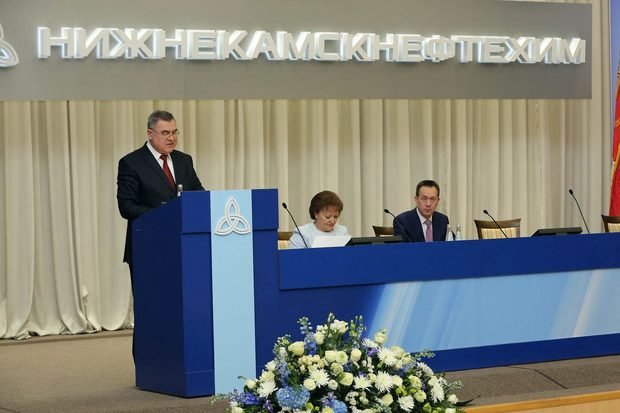
The work on the social protection of the collective is planned to continue further on. This is why last year's collective agreement was used as an example, and all social commitments were saved in the new document. But if earlier the agreement was adopted only for one year, this time it was decided to change the tradition and sign the document for 3 years for the first time.
''So we confirm intentions of the company and the union's administration to work together and meet conditions of the collective agreement in which all social guarantees, all positive points that were mentioned in the collective agreement in 2017 saved, no clause was forgotten,'' Director General of Nizhnekamskneftekhim Azat Bikmurzin explained to the conference's participants.
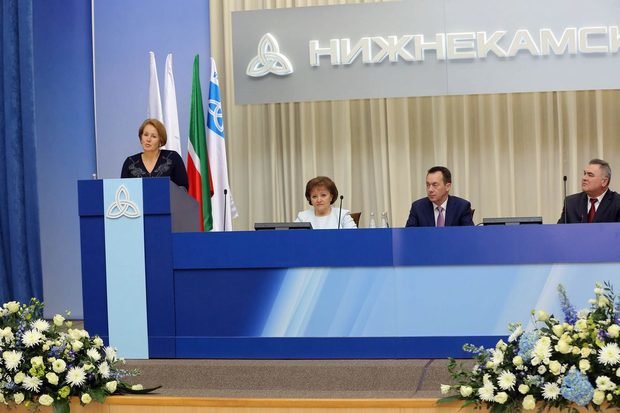
''The majority of the enterprises in Tatarstan adopts collective agreements for one year, and few of them sign for three years. Only 10-15 enterprises out of 100 enterprises sign a collective agreement for 3 years. It's risks, it's commitments that are registered in a corresponding employment agency, and sides are responsible for their fulfilment. But I want to say that indicators in collective agreements in the industrial sector say that there isn't a reduction of social commitments, they try to keep the bar because any enterprise understands that the personnel potential should be not only protected but also it needs to be created a stimulus, so that any person will be interested in working in this enterprise,'' Chairwoman of the Federation of Trade Unions of Tatarstan Tatiana Vodopianova explained.
Director General of the company Azat Bikmurzin and Chairman of the United Trade Union Adip Khairullin signed the agreement.